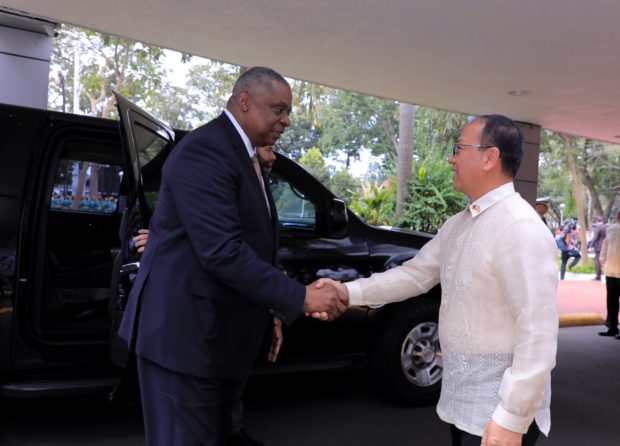PH, US reaffirm Mutual Defense Treaty commitments

Philippine Defense Secretary Carlito Galvez Jr. welcomes US Defense Secretary Lloyd Austin III in Camp Aguinaldo on Thursday. (Photo from the Department of National Defense)
MANILA, Philippines — US Defense Secretary Lloyd Austin III on Thursday said the Mutual Defense Treaty (MDT) between the United States and the Philippines has been reaffirmed, highlighting the importance of the pact as China “continues to advance its illegitimate claims” in the West Philippine Sea.
Austin made the pronouncement during a press conference after meeting with Department of National Defense Secretary Carlito Galvez Jr at Camp Aguinaldo in Quezon City.
“Today, Secretary Carlito Galvez and I also reaffirmed our Mutual Defense Treaty commitments,” Austin said.
“This is especially important as the People’s Republic of China continues to advance its illegitimate claims in the West Philippine Sea,” he added.
Austin said the two countries discussed “concrete actions” to address “stabilizing activities” within the Philippine waters.
Article continues after this advertisement“And we note that the MDT applies to armed attacks on either of our armed forces, public vessels, or aircraft anywhere in the South China Sea or the West Philippines Sea. We discussed concrete actions to address these destabilizing activities in the water surrounding the Philippines including the West Philippine Sea and we remain committed to strengthening our mutual capacities to resist armed attacks…” Austin said.
Article continues after this advertisementGalvez, for his part, said Austin’s visit “is very meaningful to us.”
“It is symbolic to all of us that the US will remain a reliable partner to the Filipino people,” Galvez said.
“These efforts, which we hope to jointly undertake are in line with the guidance of President Ferdinand Marcos Jr., and that is for the Defense department to make sure that not an inch of our nation’s territory will be lost and our people’s safety and security will be ensured,” he added.
In 2016, the United Nations-backed Permanent Court of Arbitration in The Hague invalidated China’s claim to almost the entire South China Sea but Beijing has not recognized the ruling.
The tribunal ruled that China’s claim had no basis in international law and that it had violated the Philippines’ sovereign right to fish and explore resources in the West Philippine Sea, the waters within the country’s 370-km EEZ in the South China Sea.
The Philippines, under the administration of then President Benigno Aquino III in 2013, challenged before the Hague court China’s claim to more than 80 percent of the South China Sea, which included waters in the exclusive economic zones of Brunei, Malaysia, the Philippines, and Vietnam.